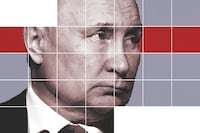Two days before Mother’s Day in Russia, Putin meets with a group of women said to be Russian mothers whose sons are fighting and dying in Ukraine. “We share this pain,” Putin tells them. “We understand that nothing can replace the loss of a son, a child.”
A week in the life of Vladimir Putin

Friday, Nov. 25: Grieving mothers, Chechen allies and Russian gunsmiths
What’s striking about this carefully selected gathering is how many of the women are presented as being from Russia’s ethnic minorities and distant regions. And here, Putin is canny. For these areas, not cosmopolitan Moscow or St. Petersburg, are supplying an inordinate share of the soldiers for the costly, unsuccessful campaign in Ukraine.
Putin tells a mother from Dagestan: “Russia as a whole is unique civilization, where people of different nationalities, ethnic groups, different religions live side by side for a thousand years.” He comforts a Cossack mother from Krasnodar; a mother from Tuva, near the Mongolian border; a mother from Sakha, in eastern Siberia.
The Ukrainians are “playing someone else’s game, but we have to fight for our interests, our people, our country,” he tells the mothers. And then he offers this extraordinary, chilling comment: “Today’s events are the way to some kind of … internal purification and renewal.”
Putin meets next with his war cabinet, the permanent members of his security council. What’s said here isn’t explained on Putin’s website. After that, he receives Ramzan Kadyrov, the leader of Chechnya, a region brutalized by Putin’s scorched-earth campaign in the early 2000s that is now supplying fighters to Ukraine. Again, no details of their conversation.
The Russian leader closes his day, after 11 p.m., with a speech to a state company called Rostec, which is struggling to maintain production of high-tech weapons despite Western sanctions.
Across the country, Rostec factories are “working at maximum capacity, in several shifts,” Putin says. “Indeed, people are working hard, looking up to our ancestors, to the great traditions of many generations of our gunsmiths, who proved by deed that Russian weapons are weapons of victory.”
At no point during this week does Putin acknowledge, in any way, that his military is conducting a brutal campaign that has terrorized Ukrainian civilians and made the country itself, rather than Ukraine’s armed forces, its target. This was a week when Putin fired scores of missiles and drones at Ukraine’s infrastructure, trying to freeze the nation into submission. Much of the world is outraged, but Putin appears oblivious.
Over this week, Putin tries instead, in nearly every encounter, to justify a war that many Russians don’t understand. He is an enigmatic leader, everywhere and nowhere. He talks falsely of Russia as the victim, rather than the aggressor. His confidence never appears to flag. But he would not work so hard to appear all-powerful if he didn’t fear that the foundation beneath his throne was fragile.






